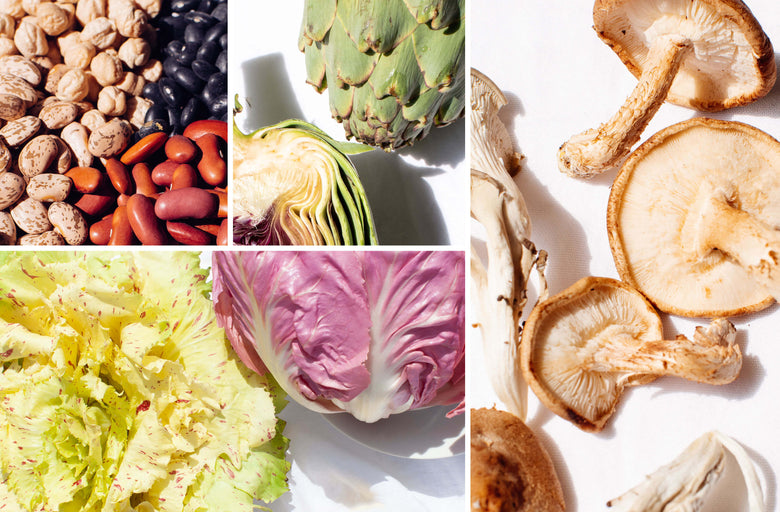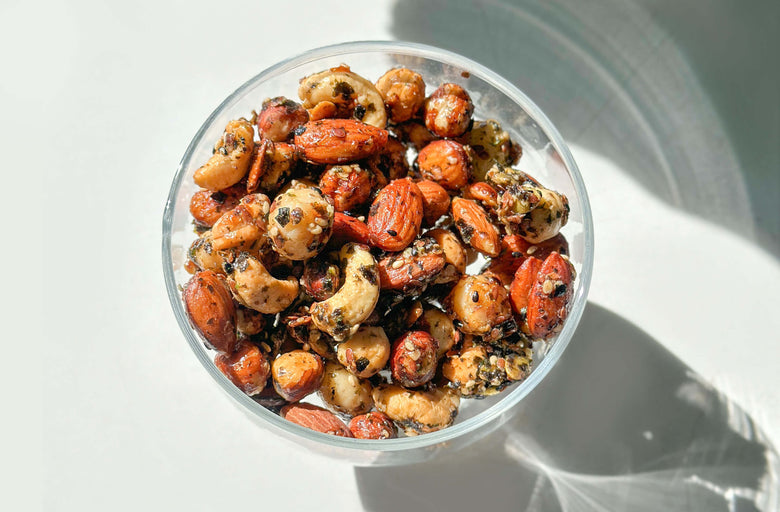Traditional wisdom of the modern western world would have you believe that eschewing animals in your diet will lead to deficiencies—but that’s an outdated notion. Mother Earth is a benevolent spirit, and the plants that grow from her soil provide all the nourishment your body needs for healthy tissues, ageless skin, a strong heart, and a sharp mind. Favoring plant nutrition benefits not only our health but the health of our planet. Research shows a strong link between eating more plants and fewer animal foods, and lower risk of heart disease and diabetes.
The production of animal-based foods is also taxing the planet. As affirmed by the recent EAT-Lancet Report, a plant-based diet addresses both factors better than any other mode of eating—and we promise, you won’t miss a nutritional beat.
Favoring plant nutrition benefits not only our health, but the health of the planet.
Earth’s Amino Acids
Anyone who abstains from eating animal-based foods has fielded questions about where they get their protein. The answer for plant-based eaters is, the same place animals get their protein from: plants. That’s the dilemma with eating animal-based foods: you’re not just eating that filet mignon, but also whatever the cow ate during its life. Given the state of factory farming in the U.S., that’s likely genetically modified and pesticide-ridden corn, soy, and wheat—all of which can cause harmful inflammation in the human body. This is why provenance is so important when choosing to eat meat. Or, you can avoid the issue altogether—while embracing the health and environmental benefits of eating more plants and fewer animals—by focusing your protein consumption on plant foods.
Remember that the macronutrient “protein” comprises chains of organic compounds called amino acids, and all plants have at least some of them. Pay special attention to the nine essential aminos (histidine, isoleucine, leucine, lysine, methionine, phenylalanine, threonine, tryptophan, and valine), which your body can’t produce itself and must source from food. When these amino acids link up, they form the proteins your body needs to form healthy tissues, make hormones, and satisfy hunger.
Many plant foods, including hemp seeds, quinoa, and spirulina, are comparable to animal foods in that they are complete proteins, offering all nine essential aminos. Along with incorporating these nutrient-dense ingredients, the key to getting sufficient protein on a plant-focused diet is to prioritize variety: the usual suspects like beans, chickpeas, nuts, and seeds, but also plenty of fruits, vegetables, and whole grains. Almond butter at breakfast, a colorful salad sprinkled with pepitas and hemp seeds for lunch, and a quinoa-and-vegetable grain bowl for dinner will cover your bases. If you choose to supplement, seek powders and bars that contain protein from whole-food plant sources like sesame, hemp, pea, and pumpkin seeds, instead of highly processed, dairy-based whey protein, which can challenge the digestive system.

“Plant Collagen” for Ageless Skin
Collagen is the nutrient du jour, showing up in everything from face masks to popcorn. The body has natural collagen stores in its connective tissues, joints, and skin, but production slows down after age 25, resulting in complexion dullness and slackness. While many common beauty supplements get collagen from the source—animal bones and hides—plant nutrition can work magic to reclaim youth’s signature buoyancy and suppleness.
Why trade real collagen for a plant version? With popular bovine or porcine collagen supplements, you’re also getting the genetically modified corn and soy those animals are fed, plus hormones they’ve given to bulk up, which can trigger inflammation and create an acidic environment in the body that leads to health issues. The absorbability and assimilation of animal collagen is also yet to be fully proven, meaning it’s scientifically unclear whether taking extra collagen is even effective.
The plant world takes on natural collagen loss differently: by enhancing the body’s ability to maintain and restore its own collagen reservoirs. Phytoceramides are botanical lipids that help restore the skin’s barrier, delivering on the same promise as collagen beauty supplements by sealing in moisture, plumping up fine lines, and fighting free radicals. Beyond supplementing with phytoceramides, make sure you’re consuming plenty of the nutrients necessary for collagen formation, including vitamin C, zinc, selenium, and copper, all of which are found in abundance in plants.
your body requires a plethora of nutrients to function optimally—and contrary to what you might have heard, plants tick every box.
Marine Flora for the Head and Heart
The “3” in omega-3 fatty acids refers to Alpha-lipoic acid (ALA), Docosahexaenoic acid (DHA), and Eicosapentaenoic acid (EPA). These healthy fats get a lot of buzz because they are the primary building blocks of the brain, and are known to prevent depression and support moods. Long-chain omega-3 fatty acids also help promote the master hormone known as the Brain-Derived Neurotrophic Factor (BDNF). BDNF controls neuroplasticity, or the brain’s ability to make new synaptic connections and learn new patterns—critical for healthy brain aging.
Omega-3 fatty acids also support heart health. A 1970s study looked at the diets of the Inuits of Greenland, who ate extremely high-fat diets yet had low incidence of heart problems. This solidified DHA and EPA’s shared reputation as a panacea for heart disease, which remains the number-one killer of men and women in the United States.
Based on the research, health experts started recommending eating lots of fish to get enough of these essential fats. Modern environmental concerns make this option less attractive. Polluted oceans and unsustainable fish farming practices mean that with many fish oil supplements, you’re ingesting mercury, hormones, and other impurities along with your healthy fats.
Since omega-3 nurtures two of your most sacred organs, you may want to supplement, and the cleanest, most eco-friendly move is to choose a vegan omega. Fish get their EPA and DHA from plants—specifically, microalgae and marine flora. You can replace your daily fish oil pill with a plant-sourced version made with high-quality algae oil like the kind derived from schizochytrium sp, which has been researched to not only boost omega-3 in the body but also antioxidant enzyme activity and immune response.
Of course, getting nutrients from food is always best, so incorporate organic sea vegetables like nori and kelp into salads, soups, and macrobiotic bowls for more EPA. To be more discrete with the sea veggies (because we admit a kelp smoothie doesn’t sound the most appetizing), rich chocolate Metabolism Super Powder includes fucoxanthin, an Atlantic brown seaweed that promotes DHA. For whole-food plant sources of DHA and EPA, choose algaes like spirulina and chlorella, which can be whisked into a salad dressing, blended into a shake, or taken in supplement form.
A Garden of Micronutrients
Aside from the heavy hitters mentioned above, your body requires a plethora of nutrients to function optimally—and contrary to what you might have heard, plants tick every box:
Vitamin A: Crucial for radiant skin and healthy immunity, vitamin A in supplement form is often sourced from fish livers. Its precursor, beta-carotene, can be derived from algae. The vitamin A in Sakara’s Superfood Multi, found in The Foundation daily supplement packs, is algae based.
Vitamin D: Often called the sunshine vitamin because your body soaks it in from the sun’s rays, this immunity-boosting nutrient regulates mood, improves cognition and works with the parathyroid glands to produce calcium. Vitamin D3 is preferable to D2, but can be tough to source from plants. Sakara did it again with the Superfood Multi, which contains vegan-certified vitamin D3 derived from lichen instead of the more common source, lanolin from sheep’s wool.
The plant world takes on natural collagen loss differently: by enhancing the body’s ability to maintain and restore its own collagen reservoirs.
Vitamin B12: Plant-based eaters and the people who love them are often concerned with B12 intake; low levels are linked to fatigue and weakness because B12 supports red blood cell production. It’s primarily found in animal foods, but you can find vegan-friendly B12 in Sakara’s Energy Super Bars and the Adaptogenic B Complex supplement found in The Foundation.
Iron: This mineral helps form red blood cells to ferry life-giving oxygen throughout the body, and to produce hormones. Red meat is hardly the only place to get it; nutrient-dense superfoods like lentils, pumpkin seeds, quinoa, pistachios, dried fruits, and chickpeas all offer iron in plant-based form.
Calcium: Skip the milk mustache and ask yourself, got greens? because our leafy friends offer plenty of this bone-strengthening, teeth-perfecting mineral. The Macro Minerals supplement in The Foundation provides the perfect ratio of calcium to magnesium. Make sure you’re also loading up on vitamin D to boost calcium absorption.
To swap in plant-rich sources where animal products once took up diet real estate isn’t an even exchange—it’s better. Plants offer up an abundance of other transformative, life-giving compounds, including phytonutrients, a class of chemicals produced by plants and plants alone. Eating plant foods floods the body with antioxidants that fight carcinogens and damaging free radicals; detoxifies red blood cells and provides oxygen to your organs through the green pigment, chlorophyll; tames inflammation and revives skin with water and living, fresh foods. When incorporated in your diet, they alchemize the body to heal and perform with efficiency and fervor.
More Reads on Transformative Plant Nutrition
Foods to Unlock the Most Powerful You






